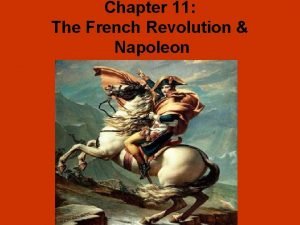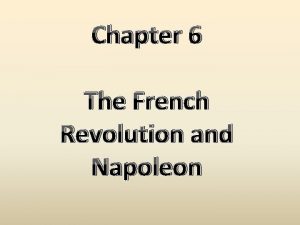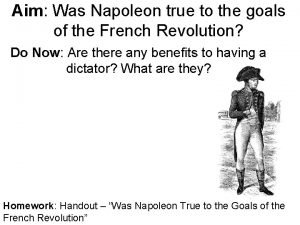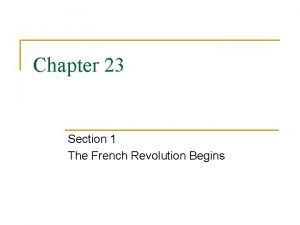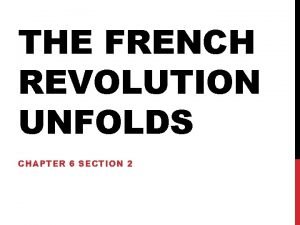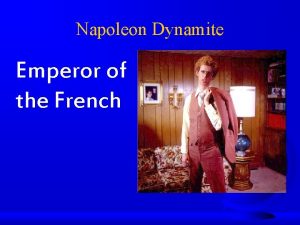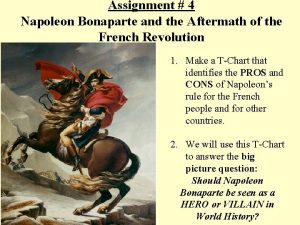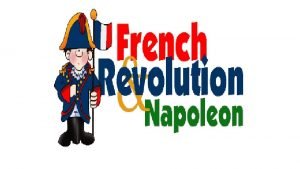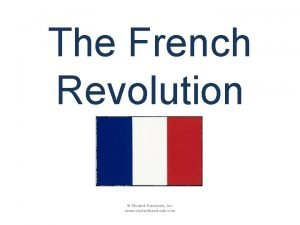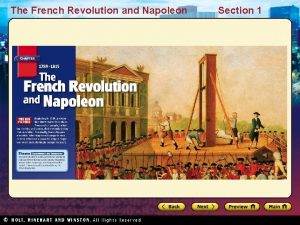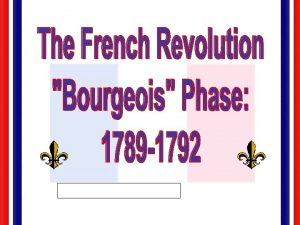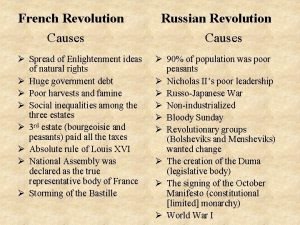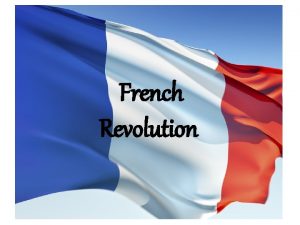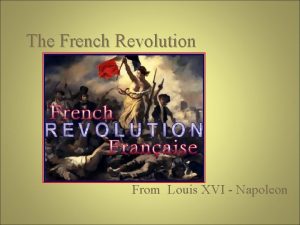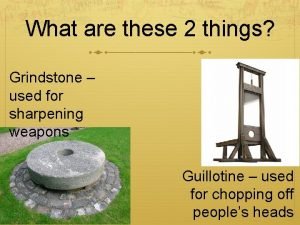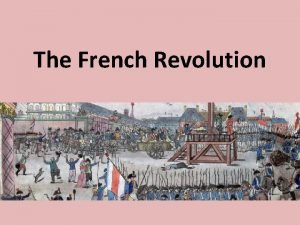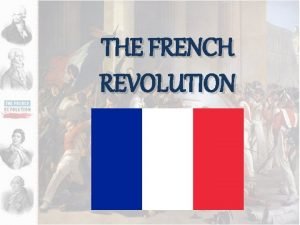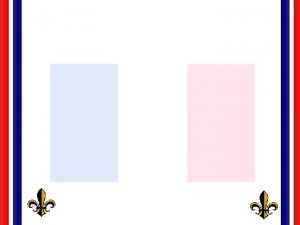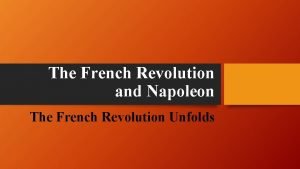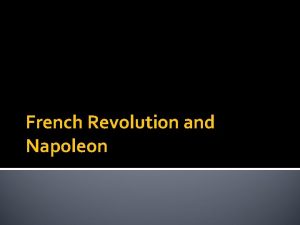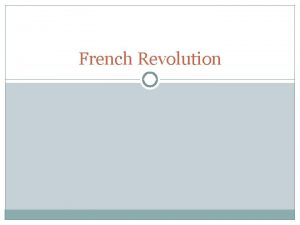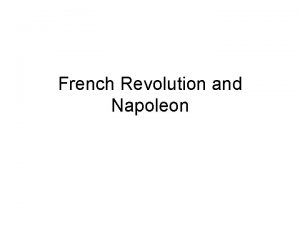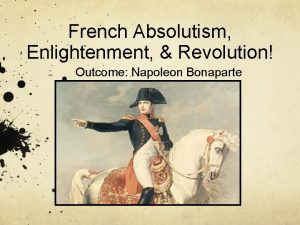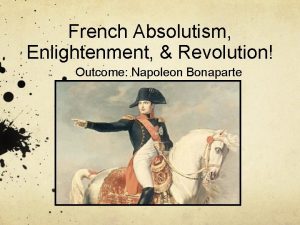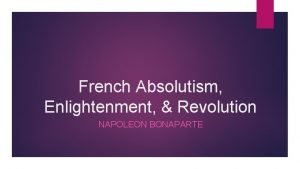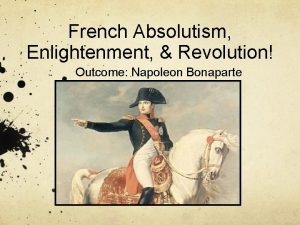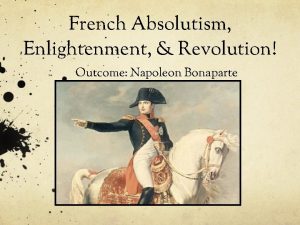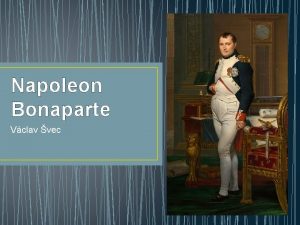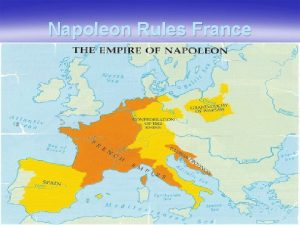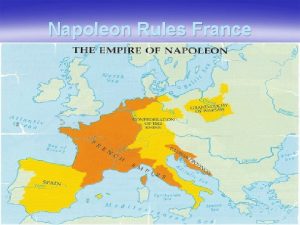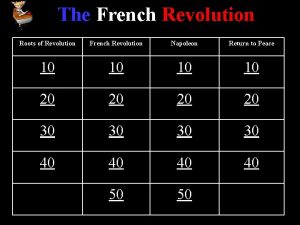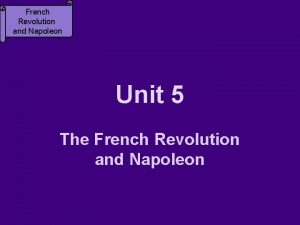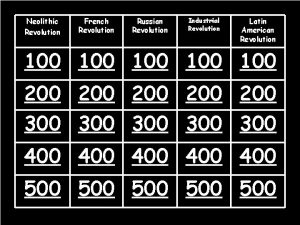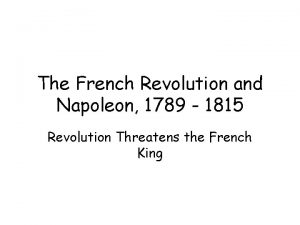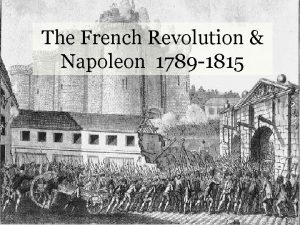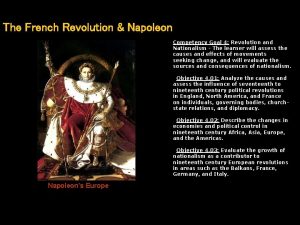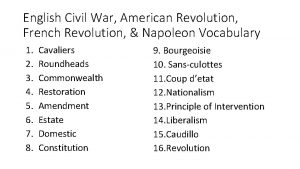Chapter 6 The French Revolution and Napoleon Friday























- Slides: 23

Chapter 6 The French Revolution and Napoleon

Friday October 7

6. 1 -On the Eve of Revolution-The Old Regime • Everyone belonged to a class • First Estate-wealthy clergy, paid no taxes, owned about 10% of the land with about. 5% of the population • Second Estate-nobility, had jobs in government, the army, the courts, and the Church, owned about 20% of the land with about 1. 5% of the population • Third Estate-common people, owned about 70% of the land with about 98% of the population • Bourgeoisie-middle class • Bankers, merchants, and manufacturers, lawyers, doctors • Peasants-9 out of 10 in the Third Estate were peasants • Urban workers-poorest in the Third Estate • Apprentices, journeymen, servants, unemployed

Discontent • The Third Estate did not think it was fair that upper-class had so many privileges • They were burdened by taxes and wanted the privileged classes to pay their share Economic Troubles • Louis XIV left France in dept so government increased taxes and reduced expenses • Bad harvest and high food prices led to riots and peasants began to attack manors Louis XVI calls the Estates General • Cashiers-notebooks that listed grievances of all three estates • Wanted fairer taxes, freedom of the press, and regular meetings of the Estates General • Class resentments were brought to light

Tennis Court Oath • Delegates were elected from each Estate but only those with property could vote. • Mostly lawyers, middle-class officials, and writers • Wanted votes counted by hand instead of by Estates • Third Estate declares themselves the National Assembly, representing the people of France • They invited the representatives from the other Estates to join them in writing a Constitution • Their meeting hall was locked and guarded so they moved to the tennis courts • Louis XVI accepted the oath but rumors were spreading…

Storming the Bastille • July 14, 1789 -crowds gathered outside the Bastille (a jail) and demanded weapons and gunpowder that was believed to be kept there • Commander of the Bastille refused to open the gates and opened fire on the crowd • Eventually the crown broke through and killed the commander and 5 guards and released some prisoners • This event became a symbol of the French Revolution and is now a French national holiday

Cause and Effect worksheet CNN student news

Monday October 10

6. 2 -Creating a New France Take notes over this section on the worksheet provided. Complete worksheet

Tuesday October 11

6. 3 -Radical Days Take notes on your own in your notebook then do the section review questions 3 -5

Wednesday October 12 Vocab quiz Notes

6. 4 -The Age of Napoleon Begins Napoleon’s Rise to Power • At age 20 he was a lieutenant during the French Revolution and rose quickly in rank • His successes led him to be a political leader • He overthrew the Directory and set up a 3 man governing board known as the Consulate • He was named Consul for life and eventually had enough power to become Emperor (put the crown on his own head) • What significance does this have? !? !? • Plebiscite=ballot in which voters say yes or no and each time the voters strongly supported him

Why did France support Napoleon? !? ! Because…. • Order, security, and efficiency replaced liberty, equality, and fraternity • Reforms • Economic prosperity-through controlling prices, encouraging new industry, and building new roads and canals • He set up public schools under strict government control to ensure a well trained military • Made peace with the Catholic Church • Won support across class lines • Napoleonic Code • A new law code=equality of all citizens, religious toleration, advancement based on merit • Women lost rights

Why did this help make Napolean Popular?

Building an Empire • Napoleon annexed (added outright) areas of Netherlands, Belgium, Italy, and Germany • Abolished the Holy Roman Empire and created a 38 member Confederation of the Rhine • Cut Prussian territory in half • He ruled through forceful diplomacy and put friends and relatives on the throne France Versus Britain • Battle of Trafalgar-British admiral Horatio Nelson smashed a French fleet, keeping Britain from domination by Napolean • Napolean then waged economic warfare on Britain • Blockade of ports

How was Napoleon so successful?

Worksheet

Thursday October 13

Read Chapter 6 Section 5 then answer the questions

6. 5 -The End of an Era Reading from book with guided reading questions Challenges to Napoleon's Empire 1. How did nationalist work against Napoleon? 2. What is guerilla warfare and how was it used in Spain? 3. What was the significance of Napoleon marrying princess Marie Louise? 4. What is “scorched earth” policy? Downfall of Napoleon 1. What countries were in the alliance against France? 2. What does abdicated mean? 3. What are 3 of the impacts Napoleon had on France? The Congress of Vienna 1. What was the goal for the Congress of Vienna? 2. What does legitimacy mean? 3. What were the problems that the Congress of Vienna created?

Friday October 14 Practice planned reading test Wrap up chapter 6 CNN student news

Monday October 17 Review page 192 1 -17 Tuesday October 18 Chapter 6 Test
 Chapter 11 the french revolution and napoleon
Chapter 11 the french revolution and napoleon Chapter 23 the french revolution and napoleon
Chapter 23 the french revolution and napoleon Chapter 11 the french revolution and napoleon
Chapter 11 the french revolution and napoleon The french revolution and napoleon section 3 quiz
The french revolution and napoleon section 3 quiz Napoleon goals
Napoleon goals Russian revolution vs french revolution
Russian revolution vs french revolution How could the french revolution have been avoided
How could the french revolution have been avoided Chapter 7 section 1 the french revolution begins
Chapter 7 section 1 the french revolution begins Chapter 23 section 1 the french revolution begins
Chapter 23 section 1 the french revolution begins Chapter 6 section 2 the french revolution unfolds
Chapter 6 section 2 the french revolution unfolds Napoleon dynamite french
Napoleon dynamite french Where did napoleon rule
Where did napoleon rule French revolution causes and effects
French revolution causes and effects Causes and effects of the french revolution
Causes and effects of the french revolution French revolution
French revolution French revolution causes and effects
French revolution causes and effects French revolution causes and effects
French revolution causes and effects Enlightenment and french revolution
Enlightenment and french revolution Outcome of french revolution
Outcome of french revolution Jack and jill french revolution
Jack and jill french revolution The third agricultural revolution
The third agricultural revolution Grindstone french revolution
Grindstone french revolution France monarchy timeline
France monarchy timeline French revolution calender
French revolution calender
